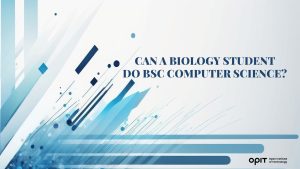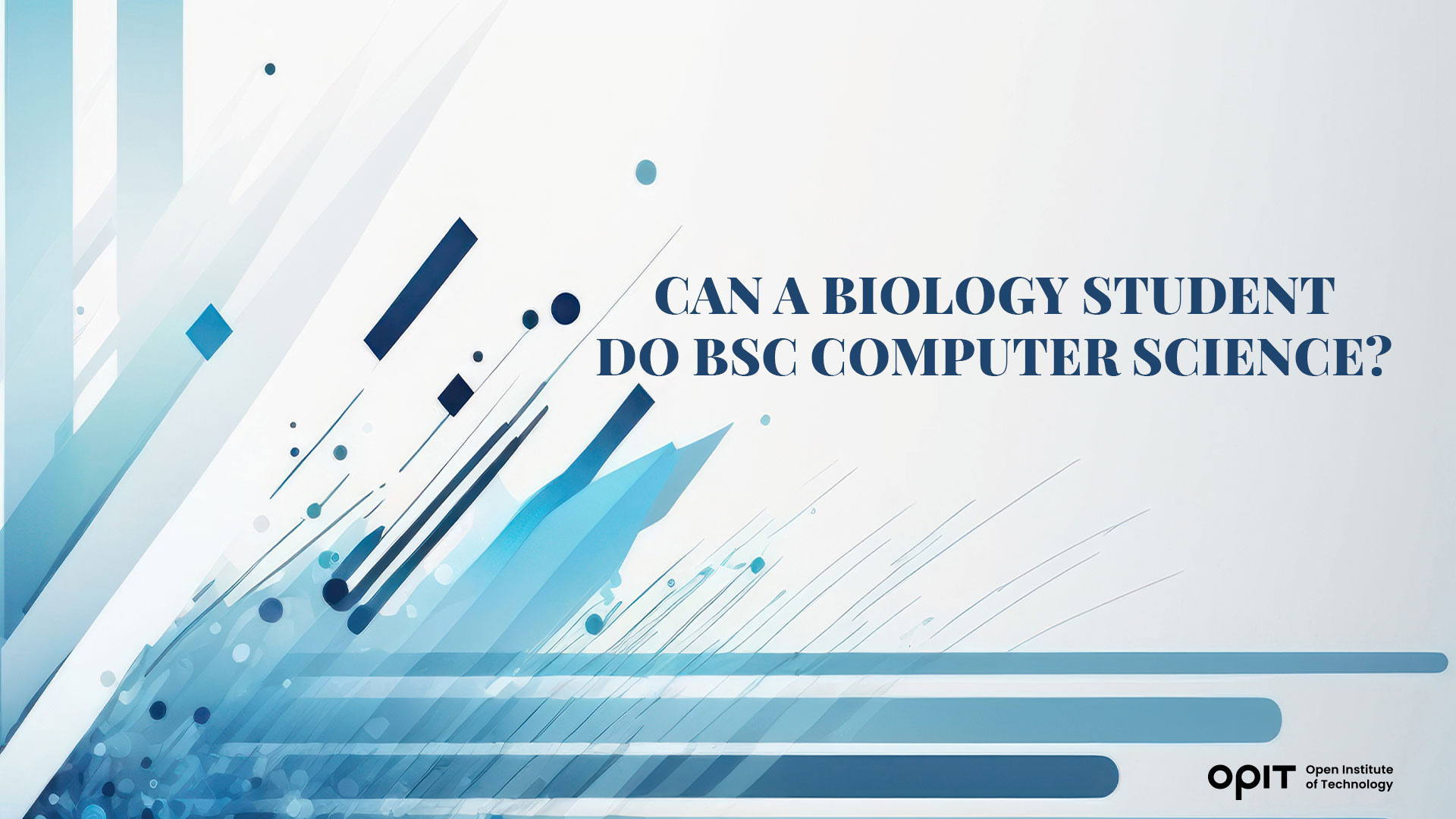Most of the modern world – work, private life, and entertainment – revolves around computers and IT in general. Naturally, this landscape creates a high demand for computer science jobs. As a result, BSc Computer Science positions are well-paid and offer excellent career opportunities.
With all these advantages considered, it’s no wonder that people from other professions pivot toward computer science. This includes biology students, too.
But can a biology student do BSc Computer Science? And, equally as important, should they?
The answer to the first question is relatively complex and will represent the bulk of this article. But the second answer is a resounding yes. Interdisciplinary education can be a massive advantage in today’s world, providing venues for innovation and greater career advances.
Let’s delve deeper into the question of can a biology student do BSc Computer Science.
Background on BSc Computer Science
A BSc degree is often a part of professional development for people interested in IT. The degree usually follows a core computer science course. After obtaining the BSc, you can move forward towards a specialization or pursue a PhD in the field.
As a biology student, your path to BSc Computer Science will be different. The first step on the way is to understand what computer science is, which areas it covers, and what core skills it requires. This section will explain just that, plus the career opportunities that come with BSc Computer Science.
Definition and Scope
Computer science deals with computer systems. If you’re (rightfully) wondering what that means precisely, the answer is: practically anything related to computers.
A computer scientist can work on the architecture and structure of a processor chip. On the other hand, their colleague could be engaged in supporting the structure of the internet. Both roles fall under the umbrella of computer science.
At its core, this branch of IT concerns with questions about the nature of computing. In that light, one of the computer scientist’s main tasks is to understand what a computer system is. Then, these professionals can move onto designing different systems for particular purposes.
Core Subjects and Skills
BSc Computer Science courses teach core subjects that provide the essential skills for the job. As you might presume, programming is the crucial skill of a computer scientist. This skill requires proficiency in programming languages and a deep understanding of data structures. In addition, knowing the ins and outs of algorithms is pivotal for programming.
Software development is another skill that computer scientists must have. Besides coding knowledge, this skill calls for high proficiency in the principles of software engineering. A good computer scientists should be able to perform the entire development process from coding to implementation.
Computer science calls for a good understanding of math basics like algebra and calculus. However, advanced techniques will also be necessary.
Finally, a computer scientist should have a firm grasp on data analysis and visualization. The former improves professional capabilities, while the latter helps communicate the data to the stakeholders.
Core subjects in BSc Computer Science courses that tackle these and other skills include:
- Programming principles
- Computer networks
- Computer architectures
- Foundational mathematics
- Data structures and Algorithms
- Web development
- Introduction to operating systems
- Cloud computing
- Programming paradigms
Job Prospects and Career Opportunities
Employment in the computer science sector is growing rapidly, following a trend that’s projected to continue throughout the decade. The U.S. Bureau of Labor Statistics expects a 15% growth in the computer science landscape, along with hundreds of thousands of new jobs.
As the IT sector keeps innovating, even more jobs may become available. After all, many of today’s most desired professions didn’t exist at the start of the century, and computer science is developing rapidly.
Some of the career opportunities in computer science are for programmers, systems analysts, support specialists, software and computer engineers, and data scientists.
Check out OPIT degrees
-
Career aligned
-
Fully Online
-
EU-accredited institution
Comparing Biology and Computer Science
The question of can a biology student do BSc Computer Science comes down to a few crucial considerations. One of the first things you might ask is: what do computer science and biology even have in common.
Surprisingly, there are considerable similarities between the two fields.
Similarities
The most obvious aspect that computer science and biology share is that both are scientific disciplines. This means that the scientific approach is a hard requirement for both fields.
Biology and computer science aim to solve problems following two crucial methods: data analysis and interpretation and the scientific principle. A computer scientist will follow the same path to a conclusion as a biologist:
- Observation
- Question
- Hypothesis
- Prediction
- Testing
- Iteration
Furthermore, both disciplines will utilize mathematical models, although computer science will lean into math more than biology. Lastly, living organisms can be thought about as systems, which is somewhat similar to a computer scientist’s understanding of computers and other IT technologies.
Differences
Of course, the differences between biology and computer science will be much more evident. The two fields employ completely different sets of skills and require knowledge specific to their subjects. Naturally, people specializing in biology and computer science will also have completely different career paths.
When it comes to the underlying principles behind the two sciences, other crucial differences come to mind:
- Computer scientists regularly build artificial systems while biologists explore natural ones.
- As a science, biology is more based on observation, unlike the often experimental computer science.
- Biology is often regarded as an applied field, while computer science may be viewed as more abstract.
Assessing the Feasibility of a Biology Student Pursuing BSc Computer Science
Now that we’ve seen what makes biology and computer science similar in some regards and different in others, let’s return to the original question:
Can a biology student do BSc Computer Science?
To answer that question, we’ll need to look at two aspects. Firstly, doing a BSc in Computer Science comes with certain prerequisites. And second, you as a biology student must be ready and willing to adapt to the new field.
Analyzing the Prerequisites
The essential skills that are required for a BSc in Computer Science include programming and mathematics. As a biology student, you’ll likely already have some courses in math, which will make that part of the equation easier.
However, programming definitely won’t be a part of the standard biology curriculum. The same goes for other computer science skills.
Yet, this mismatch doesn’t mean that a biology student can’t pivot towards computer science. The process will only require more effort than for someone with a computer science background.
To enroll in a BSc Computer Science program, you’ll need to have a good grasp of the mentioned skills. Since studying biology doesn’t offer knowledge on programming or computer science in general, you’ll need to acquire those skills in addition to your primary studies.
The good news is that you won’t need any other specific knowledge besides math and the basics of programming and computer science. If you’re seriously considering transitioning into computer science, fulfilling these prerequisites will be well worth your while.
Evaluating the Adaptability
Besides the necessary entry-level knowledge for a BSc Computer Science, another factor will determine your success: whether you can adapt to the new field of study.
The similarities between biology and computer science will play a massive role here.
You can lean into your understanding of the scientific principle and apply it to computer systems rather than biological organisms. The transition can be viewed as following the same general methods but using them on a different subject.
Also, data collection and analysis skills will be an excellent foundation for computer science. These skills are vital in biology. Luckily, they also represent an essential part of computer science, so you’ll be able to apply them to the new discipline relatively easy.
Granted, the usefulness of your prior knowledge and skills will reach a limit at a point. Then, you’ll need to show another crucial quality: the willingness to adopt new concepts and learn new subjects.
Your advantage will be in the foundational scientific skills that you’ll have as a biologist. Building on those skills with computer science-specific knowledge will make your transition smoother. The key consideration here will be that you’re ready to learn.
Options for Biology Students to Transition Into BSc Computer Science
The final part of answering the question of can a biology student do BSc Computer Science is the practical method of transitioning. You’ll have several options in that regard:
- Enroll in a bridge course or a preparatory program
- Complete an online course and get the appropriate certification
- Rather than biology alone, opt for an interdisciplinary degree or a dual-degree program
- Pursue a biology degree simultaneously with a computer science minor
Each of these options will help you gain the necessary knowledge for the BSc and prepare for a career in computer science.
Check out OPIT degrees
-
Career aligned
-
Fully Online
-
EU-accredited institution
Can a Biology Student Do BSc Computer Science? Absolutely!
As you’ve seen, the path from a biology student to BSc in Computer Science isn’t a straight one. However, it’s completely achievable if you have the motivation.
Getting interdisciplinary education will represent an excellent opportunity for professional growth. Better yet, it will open up your possibilities for personal development as well. Learning about a new discipline is always a benefit, even if you pursue a different career path later in life.
If computer science sounds like an interesting prospect, nothing stops you from following that line of study. Fortunately, the opportunities for just that are readily available. Enlist in a quality BSc course and start building your knowledge base and skills.






